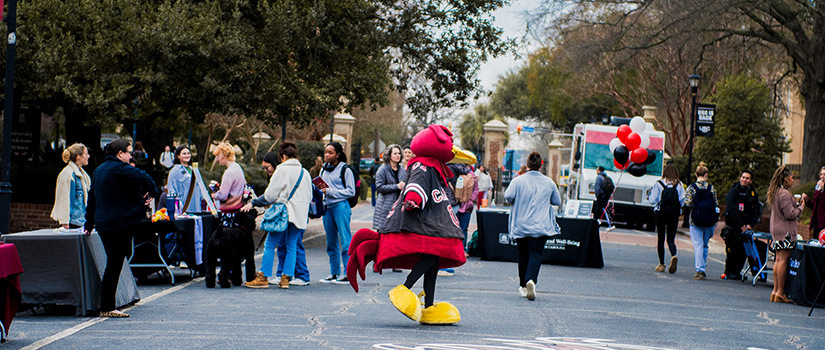Health Promotion Programs
Gamecocks Stand Up is the University of South Carolina's bystander intervention initiative based on the idea that Gamecocks stand up for each other in big and small ways. By empowering everyone in the Carolina community to be an active bystander, we can influence the outcome of potentially harmful situations and impact our culture.
- Recognize: Looking for signs that someone may be experiencing discrimination, hazing, mental health challenges relationships violence, substance misuse, etc.
- Decide: Determining how you might address a concern – direct, distract, delegate
- Stand Up: Take action!
Consent education is essential for colleges students. Consent is everywhere in our daily lives, not just in romantic or sexual relationships. We define consent as:
- Giving someone permission or agreeing to do something
- A clear, knowing, and voluntary agreement to participate in mutually agreed upon acts
- Engage with SAVIP programs to learn more!
There are many types of relationships that we navigate throughout our lives, such as those with family, friends/peers, partners/significant others, and more. It is our goal to help students recognize the differences between healthy, unhealthy, and abusive relationships. Our programs emphasize the components of healthy relationships:
- Communication: Using written, verbal, or physical skills to intentionally understand someone else
- Boundaries: Guidelines, rules or limits that can help someone feel safe, comfortable, and respected
- Respect: Having regard for feelings, wishes, rights, traditions, and/or cultures of others.
Mindfulness and resiliency play crucial roles in supporting students' mental well-being, academic performance, and overall college experience. Our program foster both mindfulness and resiliency to help students manage stress, navigate college life, and bounce back from academic and personal challenges. Outside of our programs, you can visit our C.A.L.M Oasis on the 2nd floor of the Center for Health & Well-Being (Room 215) to practice mindfulness, to meditate, or simply to take a quick break between classes. Group yoga in the space is currently unavailable.
A Registered Dietician can assist you with medical nutrition therapy needs such as food allergies, eating disorders, high cholesterol, high blood pressure, and other dietary needs. We use Health at Every SizeTM principles and do not make weight loss a goal.
Learn more about our nutrition services under the Wellness Services tab.
This area of programs provides education across the eight dimensions of well-being. We have fun and unique offerings that address health topics which specifically impact college students. For example, you can:
- Visit our Healthy Carolina Farmers Market on Tuesdays for fresh produce
- Learn about sleep health from a Goodnight Gamecocks program
- Develop your understanding of health literacy
- Support a strong body image and learn about joyful movement
- Educate yourself about USC’s Tobacco Free policy
We provide a safe, judgment-free space for conversations about sex, relationships, and offer informed decision-making skills about your sexual health. Visit our office on the first floor of the Center for Health and Well-Being for free safer sex supplies and sexual health advice from our sex educators. Using condoms consistently and correctly is the best way to protect yourself and your partner from unintended pregnancy and infection.Drop by to pick up:
- External condoms (a variety of sizes, brands, and specialty features)
- Internal condoms
- Dental Dams
- Water-based and silicone-based lubricant
- Informational materials
We understand that the needs of all health communities are not the same. Resources
are
available at the Center for Health and Well-Being for needs related to LGBTQIA+ health.
Learn more about our STI consultations services under the Wellness Services tab.
